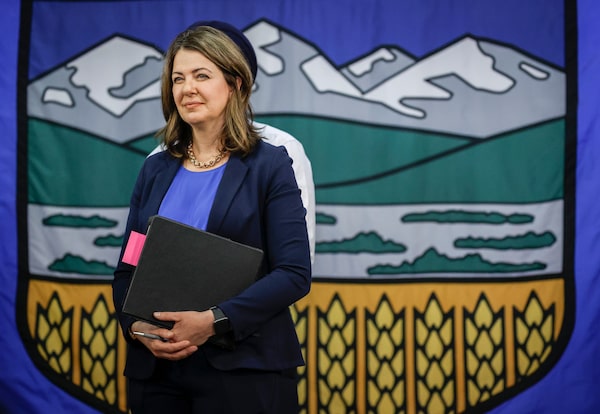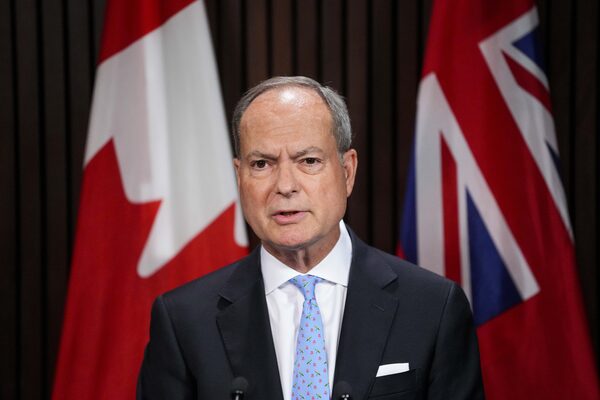
Alberta Premier Danielle Smith has said the provincial government will not make any decision on pulling out of the Canada Pension Plan until it has consulted with Albertans.Jeff McIntosh/The Canadian Press
Finance Minister Chrystia Freeland said she will meet with her provincial and territorial counterparts to discuss the future of the Canadian Pension Plan, as Alberta considers pulling out of the CPP while asserting that the province would be entitled to more than half the plan’s assets.
Ms. Freeland said Wednesday that she and Nova Scotia Finance Minister Allan MacMaster, whose province is currently chair of the Council of the Federation, agreed to hold a special meeting of the country’s finance ministers. She made the announcement hours after Ontario Finance Minister Peter Bethlenfalvy called for such a meeting while warning that Alberta’s proposal to leave the CPP and start its own plan risks “serious harm” for retirees across the country.
The Canada Pension Plan Investment Board has disputed Alberta’s contention that it would be entitled to withdraw as much as $334-billion from the CPP by 2027 – or more than half the plan’s $575-billion in assets. Ms. Freeland said her government believes the figures in a contentious Alberta report are wrong but acknowledged that any province or territory is permitted to withdraw from CPP.
“It’s never happened before, that’s why it is so important to have this meeting,” she told an unrelated event in Calgary. “And it’s something that we’re really going to need to talk about and work through.”
Mr. Bethlenfalvy sent a letter to Ms. Freeland earlier on Wednesday in which he said his province shares Ottawa’s “serious concerns” with Alberta’s proposal to withdraw from the CPP. He also asks for a “rigorous analysis” of Alberta’s contention that it could be entitled to more than half of the CPP’s assets.
“We believe this proposal could cause serious harm over the long term to working people and retirees in Ontario and across Canada,” Mr. Bethlenfalvy told reporters on Wednesday.
“And I believe my federal and provincial counterparts would agree with this.”

Ontario Finance Minister Peter Bethlenfalvy speaks to the media on Aug. 9, 2022.Andrew Lahodynskyj/The Canadian Press
Alberta Finance Minister Nate Horner responded to Ontario’s request in his own letter to Ms. Freeland, offering to play host to the next provincial finance meeting. Federal and provincial finance ministers typically meet every December to discuss a range of issues, including the status of the CPP, which is jointly managed by the federal and provincial governments.
“I recommend that Alberta’s potential establishment of an Alberta Pension Plan be on the agenda, and we welcome all good-faith, rigorous analysis of the CPP Act withdrawal formula in advance of that meeting,” said Mr. Horner’s letter. He added that he also wanted to discuss equalization reform, the federal fiscal stabilization formula and the carbon tax.
In an interview, Mr. Horner said Alberta is open to receiving other analyses about the plan, including from the federal government. He said his government’s commissioned analysis “shows that Alberta has put a lot more in than they’ve taken out to date, and many other provinces would be in the complete opposite position.”
“We’ve done nothing but release a report and have engagement with Albertans. So, this cake isn’t baked, no decision has been made. We’re just going through the process,” he said.
“It’s the start of the process, not the end.”
Alberta Premier Danielle Smith has said her government will not make any decision until it has consulted with Albertans – a public consultation process launched by the government is under way, led by former provincial treasurer Jim Dinning – and has promised it would hold a referendum to decide the issue, if necessary.
Mr. Horner added that Alberta has not committed to a referendum, but has said it would not proceed with the change unless it did. “We think that it’s definitely worth fair consideration. But pensions are an emotional issue, and we want to make sure that we have the support of Albertans,” he said.
The act that created the CPP gives any province the right to pull out and establish its own plan, which Quebec did in 1965.
In his letter to Ms. Freeland, Mr. Bethlenfalvy said the CPP’s greatest strength is its pan-Canadian approach, which ensures Canadians have a reliable retirement plan, no matter where they live, work or choose to retire.
“At a time when economic challenges are putting pressure on household budgets, the people of Ontario and Canada should not have to worry about the security of their retirement savings or the possibility of costly increases to contributions,” it says.
Mr. Bethlenfalvy said if any jurisdiction chooses to leave the plan, “it must be divided fairly, acknowledging the contributions made by workers in each participating province and territory. To that end, we would also welcome a rigorous analysis of the assumptions that Alberta’s proposal is based on.”
He told reporters that if Ontario were to leave the plan, the province would be entitled to 60 per cent of its assets – which does not line up with the Alberta report’s calculations. He added that Ontario would not consider leaving the CPP if Alberta did, and would not contemplate challenging Alberta’s assumptions in court.
Prime Minister Justin Trudeau last week shared his concerns about Alberta’s proposal, saying it “would weaken the pensions of millions of seniors and hard-working people in Alberta and right across the country. The harm it would cause is undeniable.”
Conservative Leader Pierre Poilievre is also encouraging Albertans to stick with the CPP, saying as prime minister he would protect it, while blaming Mr. Trudeau’s environmental policies for Alberta’s desire to split from the plan.
With reports from Bill Curry in Ottawa and Kelly Cryderman in Calgary